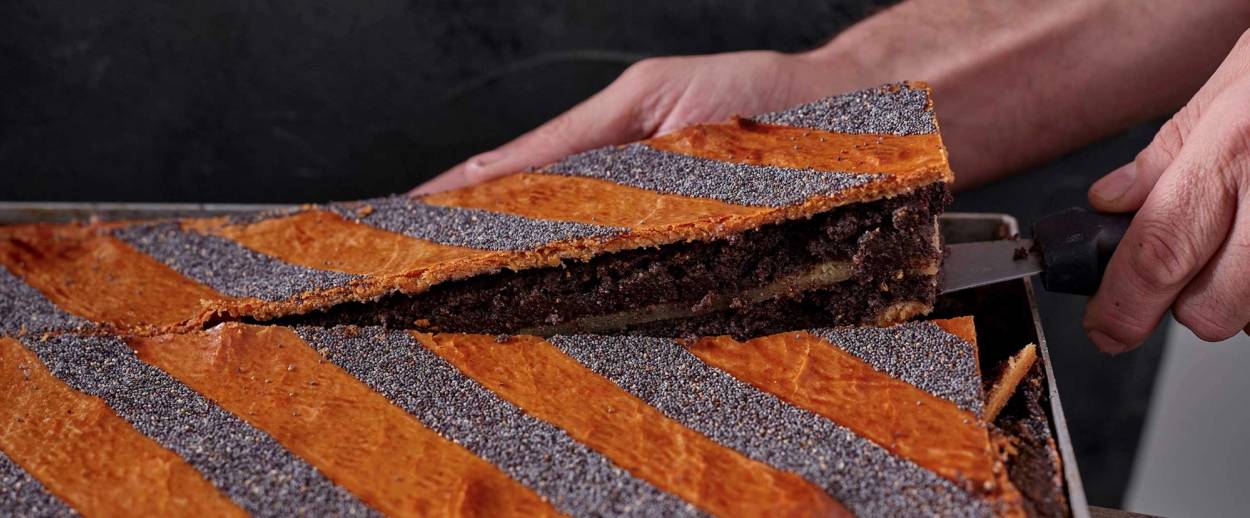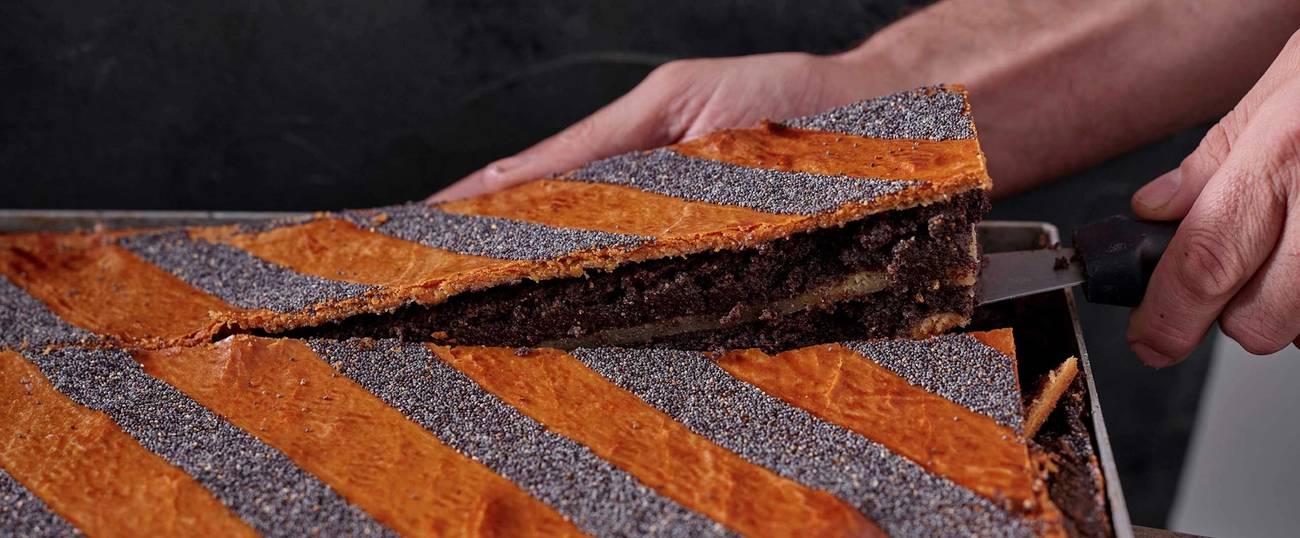Let Them Eat Cake—Again
The rebirth of Kapulski, Israel’s once-famous chain of coffee shops




Israel wasn’t always the land of culinary innovation, the way it is today. Decades ago, the foodie scene left a lot to be desired—until, in the 1970s, an elegant new chain of restaurants appeared, luring Israelis with a dining experience like no other in the country.
It was called Kapulski, the name of its immigrant family owners, who’d owned a bakery in Lithuania before making aliyah in the ’30s. The Kapulskis started opening bakeries in their new homeland, and eventually had three locations, including a central one in Tel Aviv, which, according to urban legends, sustained the bohemian souls of poet Hayim Nahman Bialik and his gang. In the ’70s, inspired by the coffee shop landscape of Italy, David Kapulski gradually grew the family business into a chain of sit-down coffee shops all over Israel, pioneering the then unheard-of-in-Israel system of franchising. Within a few years, Kapulski was everywhere, featuring an atmosphere of classic European coffee shops and serving cheesy pastas as well as rich, over-the-top cakes and desserts. It wasn’t long until Kapulski became beloved across Israel. The slogan, advertised in print and later on TV, was: nipagesh be’Kapulski (we’ll meet at Kapulski). Synonymous with decadence, sweetness, and whipped cream, the chain was especially popular with the older generations—in particular, those who’d immigrated from Europe—and families frequented the branches for special occasions.
Others tried to imitate it. As a nod to Kapulski’s successful model, a competing chain, Apropo, opened its first branch in 1978 and quickly expanded, but it collapsed into debt and legal scandal in the early 2000s. Kapulski’s sweet path came to an end as well: In 2002, when the chain comprised 50 branches, owner David Kapulski sold it, along with the factory that made cakes for all the Kapulski locations, to the large food manufacturer Vita Pri Galil, and moved his family to Sydney, Australia. Soon after the deal, the company, which was mainly interested in Kapulski’s cake-manufacturing facility, started closing the branches down.
In an interview with Ynet in 2004, David Kapulski blamed the chain’s decline—which had already begun years before the sale—on the 1995 assassination of Prime Minister Yitzhak Rabin and the generation gap, among other things: “The crisis started with the low spirits after Rabin was killed, and then the young generation didn’t want to hang out at coffee shops associated with their parents,” he said. Following the dot-com-bubble burst, faster, simpler coffee chains like Aroma and Arcafe started flooding the Israeli market, making the reality around Kapulski even grimmer. By 2010, as Israel was rebranding itself into an innovative, fresh-food destination and soaking up culinary influences from the U.S. and Asia, the now old-fashioned-seeming Kapulski was out of business as a coffee shop chain, and all but forgotten. The cakes were sold at supermarkets under the Kapulski brand, but soon they disappeared, too.
Now, years after its disappearance—and after an earlier effort to revive the brand failed to materialize—Kapulski is suddenly back.
In November 2018, a new Instagram account @kapulski_since_1934 started posting inviting images of tall layer cakes, elaborate pastries, and tempting desserts. In December, the first branch of the modern-day Kapulski opened in Ramat HaSharon, a central city known for its affluent, family-oriented population. The new branch—as of now, the only branch—looks humble, with recognizable European touches like wicker chairs and dark wood display cases, and a sign reminiscent of Kapulski’s original font. Soon, the media exploded with headlines like “Remember the Black Forest Cake? It’s Back” and “The Return of Childhood Flavors.”
How did that happen? In 2015, Kapulski went through a sale again, ending in the hands of the Engel family, which manufactures cakes and cookies. “I’m a third-generation baker, and I’ve loved Kapulski since childhood, dreaming of bringing it back,” said Liron Engel, the company owner. “We’re bringing it back as a conditoriya [confectionery], true to the Kapulskis’ original inception story from Lithuania.”
In addition to the brand name, Engel purchased the factory, which supplies cakes for the bakery, and the factory store in Netanya. According to Engel, the new Kapulski is utilizing David Kapulski’s original recipes and fine ingredients, when it comes to the old-school hits like the rum-soaked Sabrina cake, the elaborate mousse-and-meringue Concord cake, or the rich, cherry-and-chocolate-filled Black Forest extravaganza. To these classic selections, the renewed Kapulski added crowd-pleasers like cheesecakes, babkas, and quiches. And yet, the key word in Kapulski’s comeback is still “nostalgia.” “Today’s Kapulski specializes in nostalgic cakes and other desserts,” said Engel. “We emphasize flavor and looks, so our cakes look great for social media and taste great, too.” Is there room for fancy, cherry-on-top Sabrinas and mousses in Israel’s current culinary landscape? “Of course there’s more competition now, but there’s room for everyone.” Engel said.
It’s interesting to note that back in the 2004 interview, David Kapulski talked about a “wave of nostalgia” that was washing over Israel, one that could perhaps bring the chain back to life. It took a while, but it eventually happened. “Kapulski was the place to go to when we were in high school,” remembered Livnat Gotlib, a pastry chef and bakery-workshop teacher, who recently gushed about the Kapulski comeback on her Instagram account. “We’d go there and feel like grown-up ladies, ordering cake and coffee.” When she first heard of the reopening, Gotlib was surprised. “I raised an eyebrow, yes, because Kapulski is so ’80s and I didn’t think there’s room for it in 2019,” she said. But, when she overcame the worries and stopped by, she was surprised again. “We came for the nostalgia, but stayed for the flavors,” she reported. “It’s true that since the original Kapulski we moved toward the flat, delicate style of the French patisserie, but they proved that you can still revive the whipped cream classics, and make them very well.” And, unlike the Kapulski she remembers, she said, nothing was too sweet.
Since Kapulski’s reopening, many young Israeli food critics and bloggers have echoed Gotlib’s sentiment of pleasant surprise. “Remember Kapulski? We all ate here when we were kids,” said the young reporter Iftach Karmeli of Ynet, tucking, minutes later, into a rich Sabrina with utter delight. Memories, and a sense of togetherness and belonging, help sweeten Kapulski’s new offerings, and timing plays a role again—as it did when the chain closed its doors. In April, Israelis will meet each other at the polls, as the 2019 elections are fast approaching. It’s never an easy time, as differences, conflicts and prejudice come back to into the spotlight. What could be more fitting to smooth things over than a multilayered, reimagined cake from the good old days?
(Editor’s note: The original version of this story incorrectly listed the decade when the Kapulski family made aliyah. It has been corrected.)
***
Like this article? Sign up for our Daily Digest to get Tablet magazine’s new content in your inbox each morning.
Flora Tsapovsky is a San Francisco-based food and culture writer.